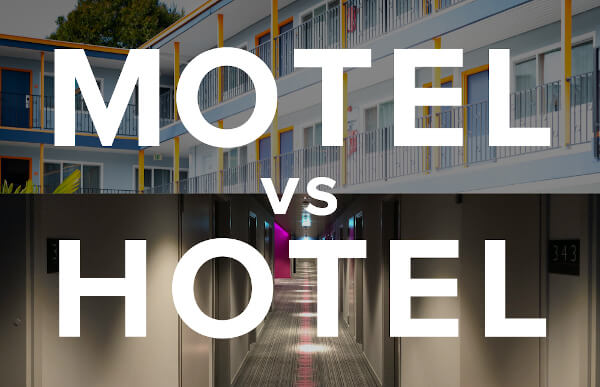
It’s probably safe to say that many people have wondered about the difference between a hotel and a motel at some point in their lives. It turns out that the issue of motel and hotel differences has its origins in the rise of automobile travel in the 1920s.
Hospitality History 101
The concept of travel accommodations is an old one, and it turns out that our English word “hotel” originated in the 1500s. “Motel,” on the other hand, was coined in the 1920s: Automobiles were becoming popular, and people started taking road trips. Entrepreneurs began to build lodging along highways and other busy roads to provide overnight accommodations for travelers.
These new lodgings were originally called “motor hotels,” though marketers eventually contracted the two words and created the concept of the “motel”: Overnight accommodation for those traveling on our nation’s roads. The motel was different from the hotel, as the latter was designed to host guests who needed to be accommodated for several days, or even weeks. Motels, on the other hand, catered to those who were still traveling to their destination or who were headed back home.
Because of this distinction, motels typically offered few, if any, amenities, such as swimming pools, restaurants, or laundry services. Guests could expect a room to spend the night, a place to park their cars, and little else. Hotels, on the other hand, offered amenities and facilities that would make a longer stay more comfortable.
Hotels and motels in the 21st century
The hospitality industry has undergone significant changes over the last several decades, with many respected hospitality brands significantly upgrading the quality of their accommodations. As a result, the differences between motels and hotels are not always clear-cut, with some hotels offering spartan accommodations and motels offering some significantly upgraded amenities for traveling guests.
Still, hotels and motels often still have some key differences that you should be aware of:
· Location: Motels are generally located along major highways. While some are relatively isolated, others are located close to other businesses that cater to travelers, including restaurants, service stations, and convenience stores. Hotels, on the other hand, are usually located in city centers or near airports.
· Facilities & amenities: Motels sometimes don’t have the kinds of amenities that you would find in accommodations for longer stays, while hotels often offer fitness centers, laundry rooms, laundry service, or swimming pools.
· Dining: Most motels don’t have a restaurant or bar while many, though not all, hotels do. A motel may provide a simple “grab and go'' breakfast or hot coffee in the lobby, but travelers shouldn’t count on it.
· Cost: Motels are often less expensive than hotels due to high guest turnover, minimal staffing requirements, and lack of amenities.
· Room door location: In hotels, guest room doors usually open to interior hallways. Many motels do not have shared interior hallways and guest room doors open directly to the parking lot.
Motel vs. hotel: Which is best?
Deciding on whether to stay at a hotel or motel while traveling is both a personal and business decision: Your needs as a traveler or business owner should be considered when making travel plans.
Your destination: If you plan to travel to a specific place and stay there for more than a few days, you’ll want accommodations that are close to where you’ll be spending most of your time. If you will be working in one area within a suburb or city, a hotel may be your best option. If your work takes you to several places in a region, and you’ll need to get on the highway every day to visit a new place, a motel might be a better choice.
Your transportation: Motels were designed to accommodate those who are traveling in a vehicle as it is easy to pull off the road and get checked in. If you are flying into an area, you’ll likely have an easier time getting to a hotel from the airport.
Length of stay: If you plan to either spend a lot of time in your room or will be staying at your destination for more than a couple of days, a hotel might be a better choice as its rooms and facilities are designed to keep guests comfortable for longer time periods.
Personal preferences and needs: Ultimately, it comes down to your travel needs. If you value safety and security, you might prefer to stay at a hotel with security, interior room doors, and its own restaurant. On the other hand, if you need to “get up and go” quickly each morning as you travel, a motel may be the better choice.
When you sign up and book rooms through CLC, you’ll be able to do research on accommodations so that you can learn about things like location, amenities, and cost. This helps ensure that you’ll find the hotel, or motel, that best meets your needs while also saving money in the process.
FAQ Questions: Motel vs Hotel
What is a bed and breakfast vs hotel vs motel?
Bed & breakfasts (B&Bs), hotels, and motels are three different types of travel accommodations:
Bed & breakfasts: B&B’s operate in residential homes or home-like buildings and offer sleeping rooms as well as breakfast in the morning. These accommodations are often unique and have a lot of character, but usually have limited amenities. For example, you may not have your own bathroom when you stay at a B&B.
Motels: Motels were originally called “motor hotels,” targeted toward family and business travelers who were traveling by car. Motels usually offer a basic level of accommodation and simple amenities, as they are designed to meet the needs of people who might only be staying one or two nights. They are often located just off highways and freeways and their room doors typically face the parking lot and are accessed from outside the building.
Hotels: Hotels are similar to motels in that they provide guest rooms to travelers. However, hotels and their amenities are often designed to accommodate longer stays and may be located in city centers or near airports. In addition, room doors in hotels are usually accessed from inside the hotel building.
How much does a motel cost vs hotel?
There are a lot of factors that affect room prices, including hotel location, amenities offered, room size, and demand for rooms. Since motels often provide fewer amenities and simpler accommodations than first-class hotels, the cost for a motel room may be less than that of a hotel. But this isn’t always the case, making it imperative for travelers to compare rates before choosing a place to stay.
What is cheaper: hotels or motels?
Pricing for both hotels and motels vary by location, level of service and amenities offered, and even the time of year. Motels are often cheaper due to their proximity to busy roads and limited amenities.
Recent Posts
-
.jpg)
U.S. Trucking Transportation Trade Shows and Conferences
Jan 23, 2025 | -

Demolish the Biggest Frustrations in Construction Travel
Nov 19, 2024 | -

Thanksgiving 2024: What Restaurants are Open for the Holiday?
Nov 19, 2024 |
